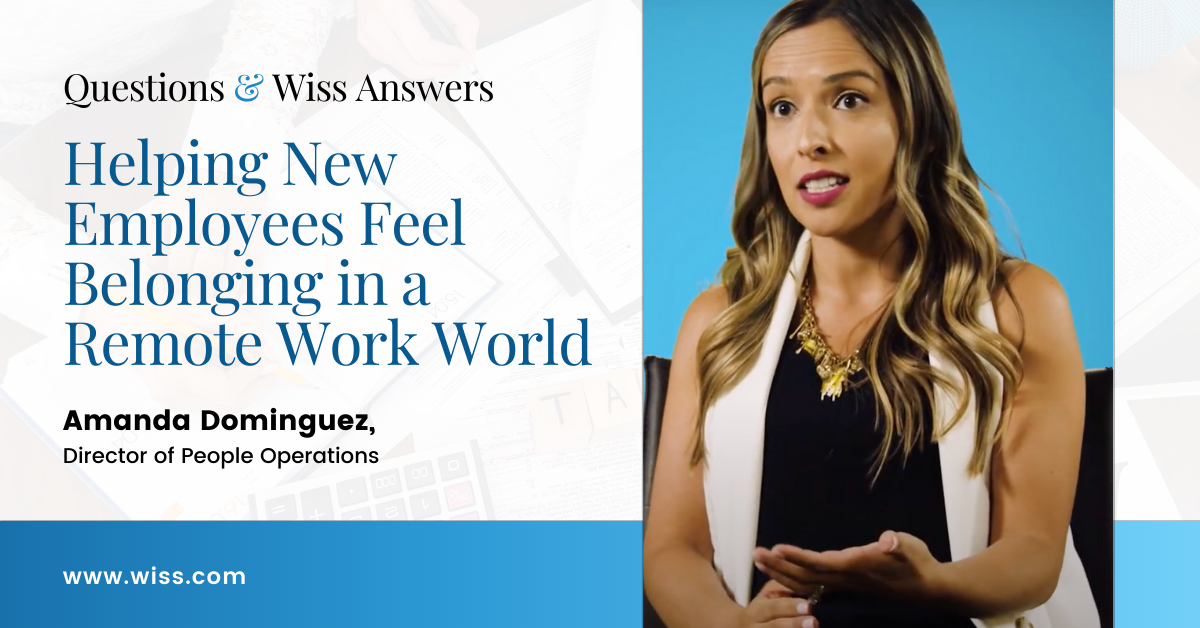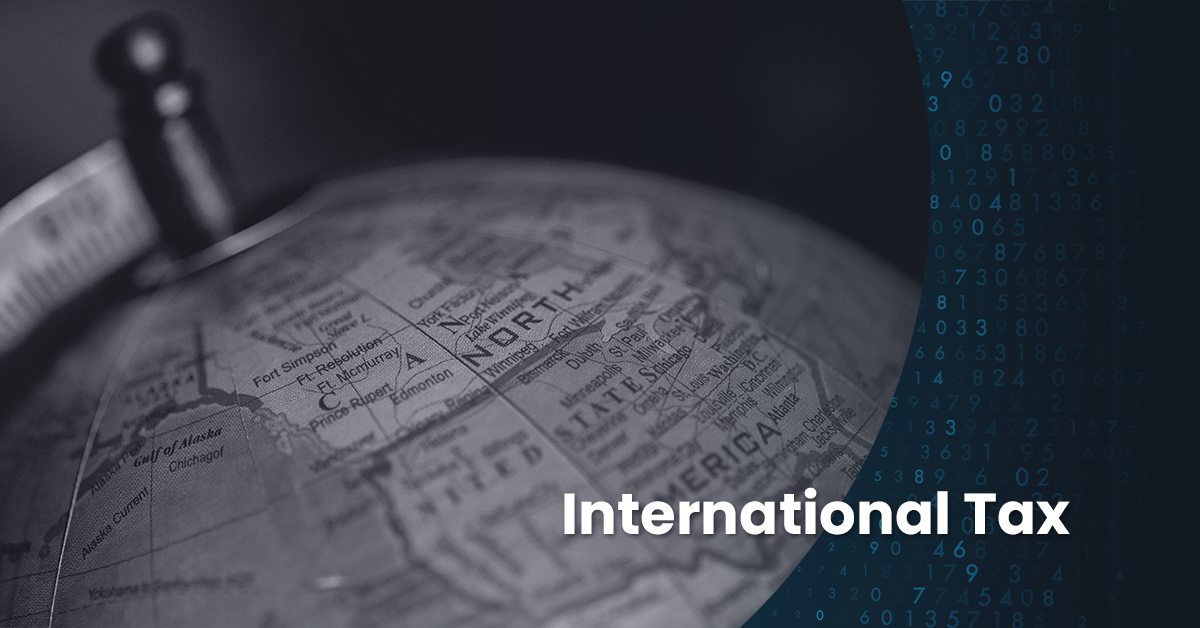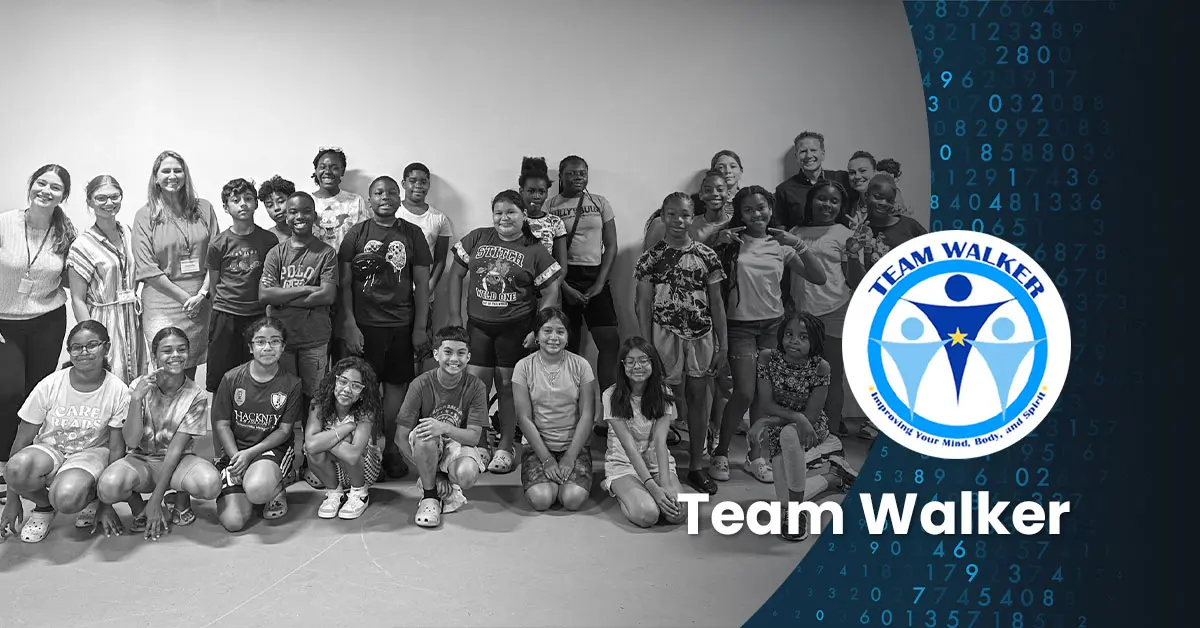Questions & Wiss Answers: An interview with Amanda Dominguez, Director of People Operations
With employees working from home, how can companies make sure new hires are really part the team? Even before the Covid-19 era, research showed that onboarding was one of the biggest challenges for organizations. The need to onboard remotely provides a chance to think about this important process in new ways, including ensuring that you’re putting the right emphasis on making sure new employees feel belonging and support.
We spoke with Amanda Dominguez, Director of People Operations here at Wiss, to learn more about how Wiss has been handling onboarding new employees in this unusual time.
Q: What has been the biggest challenge in bringing new employees on as everyone works remotely?
A: Even in the best of times, onboarding new people well is a challenge, just because it’s so critical to get an employee assimilated in the right way from the beginning. In this era when the person never even gets to set foot in your organization or see a face in person, it takes twice the effort. Getting new hires to build relationships and understand the culture are definitely the hardest parts, and they take an ongoing effort.
Q: Is cultural adjustment the number one challenge you’re trying to address right now versus the other aspects of onboarding, such as training?
A: For sure. I think we have the right infrastructure in place to get people trained, since that’s just part of our normal operation. But you take for granted being able to just pop in and say hello and welcome someone to the firm or take them out to lunch, whereas now they’re sitting at home and if you don’t make that intentional effort to reach out to them and bring them in, they end up feeling isolated.
There’s that famous quote that says, “You don’t leave an organization, you leave the people.” So if you’re not bringing someone in and making them feel a sense of belonging, that’s hugely detrimental to their trajectory in your organization.
Q: What are some of the steps you’re taking to mitigate that challenge?
A: Successful onboarding requires a partnership between HR, IT, the hiring manager and their team that they will be working in. Weeks before an individual’s first day, we begin the planning process to ensure they will have the right tools, training and foundation to build relationships from day one. We set them up to speak with a bunch of people on Zoom throughout their first day to get familiar with names and faces.
We assign them a mentor on the first day and have them set up a Zoom chat so that they can have a go-to within the firm. As HR, we always make ourselves available to them, but sometimes you want to talk to a peer instead of HR about things you’re curious about. So we set them up with that person and we ask them, especially in this remote environment, to check in at least weekly.
Especially in the first few weeks, we organize it so that people are reaching out to them regularly to make sure they are doing ok. Everyone is different. Some individuals take charge and own communication and reach out to others in the organization, but then there are others that are very timid, especially if they’re in the earlier stages of their career.
Q: What about the training part of it? Has that been beneficial in this remote environment?
A: We’ve had to pivot in our approach to training. Historically, we’ve felt that in-person training was best. You have that one-on-one attention from whoever is teaching the course, so we had a higher percentage of in-person trainings. We’ve obviously had to revisit that and put more of an emphasis on remote learning. So now all of it is done either via Zoom or via webinars that are pre-established and we can roll out easily to everyone.
Q: Are there any other new technologies that you’re bringing on board that you think will enhance this situation, whether on the technical side or cultural side?
A: It’s important to Wiss that things are still very tailored. We want our culture coming through in anything we do and we want that white-glove experience to come through, also. We’re looking to still provide those tailored opportunities, but also have a library of resources readily available to help each employee assimilate into the firm. For example, you might have a portal that you log into as a new employee, and there will be short snapshot videos that you can always refer back to. There will be videos available on basics you might be wondering about, for example, how to send a secure file, how to use Microsoft Teams, how to enter your time and expenses, etc. We’re always looking for ways to enhance communication – we recently rolled out an internal Podcast series, hosted by our managing partner that delves into inspirational topics related to culture, new skills and best practices.
Q: Are you doing things like tracking their progress? How are you ensuring accountability?
A: We have a learning management system in place. I’m proud that we’ve been moving in this direction leading up to this because this is the way of the future, COVID or not. We have a learning management system that hosts all of our trainings, almost like a course catalogue that you would see in university settings. It allows you to enroll in programs and also tracks the completion of those programs. We’ve been building a curriculum for staff at different levels.
Q: At Wiss, taking charge of your own development is a big part of what we preach. How does the onboarding and training process help with this?
A: Of course, at the heart of it all, we want everyone to be a good accountant or advisor to our clients. But that path can take a bunch of different trajectories, and you can ultimately craft that for yourself. You can choose the way you want to impact your clients the best, and I think that autonomy is really what sets Wiss apart.
As you progress in your career, you can decide what interests you, what excites you. So not only will your training be tailored to that, but also your work. That’s why we assign everyone mentors, so that your interest and then your work will start to be assigned to you differently so that you’re focusing more on your areas of interest. I switched from Tax to People, and I think that’s a testament to the culture at Wiss. We believe that you’re going to do your best work and bring your best self to work if you love what you do.
Q: Do you think Wiss’ focus on advocating for clients has been affected by this remote working?
A: I’m pretty confident in that area just because we have such well-established relationships that, in fact, during this era they’re not just reaching out to us about their audits and tax returns, but with questions more like, “How do I get through this? How do I keep my business healthy?” That is a testament to the relationships we’ve already established. Our heart is in it to really help throughout all of this, aside from anything having to do with numbers. I’m pretty confident that we’ve continued to operate in the way we always have there.
Q: How do you ensure that young people or less experienced people get exposure to clients early on in their careers?
A: We really believe in introducing our teams from a very early stage. It starts with peer-to-peer. If you are a young staff person, you will first be introduced to those in similar roles at the client – maybe a staff accountant or an AP clerk. And when you’re a middle manager, you might be interacting more with the controller or CFO. You’re meeting most of the people in the organization, so you’re still getting client interaction even though it may not be with the owner. You’re also part of the conversations partners are having with the owners – all of these experiences are preparing you to have those owner conversations down the line.
Q: How many people so far have you onboarded remotely? And is there any difference in comfort level between new employees who are just out of college and those with more experience in the workplace?
A: We’ve probably onboarded 20-25 individuals since all of this started, the bulk of which were part of our internship program that started in June. There have also been some experienced hires that we’ve brought on.
There are challenges with both. With entry-level employees and interns, you’re starting from scratch. Not only are they new to the organization, but they’re even new to accounting concepts. They’re looking to us to show them what their future could look like. It takes a lot more handholding, a lot more training, and some of the social aspects are much more important for those looking for a great culture at work. So we’ve done a lot of virtual activities to make people feel engaged, to build that camaraderie.
With the experienced hires, they often can just get up and running. They know the technical concepts, they can get started with work easily. A lot of times, they’ve worked with the software in the past. So there’s not a whole lot of training involved. Sometimes, especially at a higher level, it’s more important to assimilate them. They might be part of the management team and it’s important for them to feel like they’re in and they’re part of something.
Q: During Covid, do you see the definition of what the work day looks like changing?
A: I think this has been a huge win in terms of moving away from the “ideal employee,” which in the past has been that you come in at a certain time, you put in your 8-10 hours, and your personal life doesn’t conflict with that.
Wiss has always been good at encouraging people to bring their true selves to work – we empower our employees to work with autonomy – but some employees may still carry uncertainty. They may fear how they’re perceived if they have to deal with a personal matter or if they have to work from home on a certain day. We’ve found that in professional services companies like ours, many of us are just as productive working in this new way. We can get our work done remotely or outside the hours of 9-5 if that becomes necessary. I think that this is going to go a long way in helping leaders in firms trust their employees more and also to give employees the confidence to navigate their professional and personal lives better.
At Wiss, our secret sauce has always been the people and the interactions that we have. That has always set us apart. You lose a little of that when you’re not together, so that’s our biggest focus in bringing new people on right now.

 Previous
Previous






